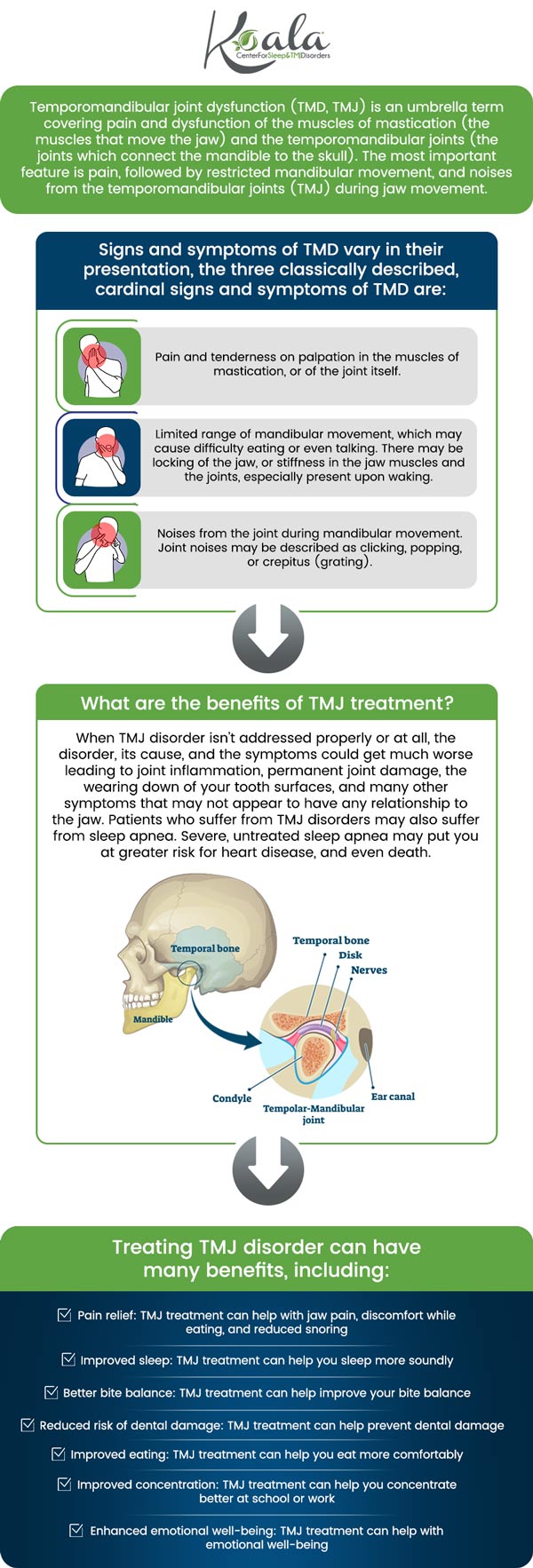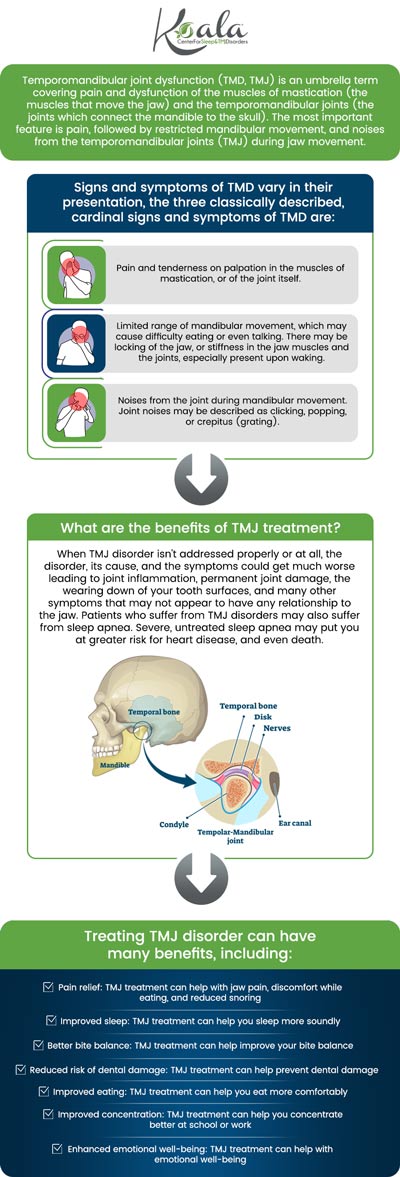Understanding the Role of TMJ Disorders in Sleep Apnea
At the Koala® Center for Sleep & TMJ Disorders, our team specializes in understanding the critical link between TMJ disorders and sleep apnea. Jaw misalignment and muscle tension can contribute to airway obstruction, leading to sleep-disordered breathing. We provide a comprehensive evaluation to address the root cause of both conditions, offering a personalized treatment plan to improve your sleep and alleviate your pain. For more information, please contact us today or request an appointment online. We have convenient locations in Bloomington IL, Peoria/Dunlap IL, El Paso TX, and Wausau WI.


Table of Contents:
What is the core connection between TMJ disorders and sleep apnea?
How does a misaligned jaw or muscle tension from TMJ affect the airway during sleep?
Can TMJ disorders directly cause sleep apnea, or do they primarily worsen existing symptoms?
Why is it important to consider both conditions during a diagnosis?
At Koala Center, we understand the close relationship between temporomandibular joint (TMJ) disorders and sleep apnea, and how they can significantly impact your health and quality of life. While TMJ disorders and sleep apnea may seem like separate conditions, research and clinical experience have shown that they often occur together and share a common root: the function and position of the jaw and its effect on the airway.
When the jaw joint (TMJ) is misaligned or dysfunctional, it can shift the jaw out of its optimal position, which may narrow the upper airway—especially during sleep. This narrowing increases the risk of airway obstruction, a defining feature of obstructive sleep apnea. Additionally, many patients with TMJ disorders experience muscle tension and altered jaw movements, which can further disrupt normal breathing patterns at night.
At our practice, we frequently see that the body’s natural response to airway obstruction during sleep is to activate the jaw muscles in an attempt to open the airway. This can lead to teeth grinding or clenching (bruxism), which not only disturbs sleep but also causes or worsens TMJ pain and dysfunction. Conversely, the repeated interruptions in breathing caused by sleep apnea can place additional strain on the TMJ and surrounding muscles, creating a cycle of discomfort and disrupted sleep.
We understand the close connection between jaw alignment, TMJ disorders, and quality sleep. A misaligned jaw or muscle tension caused by temporomandibular joint (TMJ) disorders can have a significant impact on your airway, especially during sleep. When the jaw is not properly aligned, the lower jaw can shift backward toward the throat while lying down, reducing the space in your upper airway. This narrowing makes it more likely for the soft tissues at the back of your throat to partially collapse or obstruct airflow during the night.
Muscle tension around the TMJ can further affect how your jaw and tongue are positioned. Increased tension may pull the lower jaw and tongue backward, leading to even greater narrowing of the airway. During the relaxed muscle state of deeper sleep stages, these structural changes can result in snoring, disrupted breathing, or even obstructive sleep apnea—a condition where the airway becomes repeatedly blocked, causing interruptions in breathing, lower oxygen levels, and poor sleep quality.
Our team specializes in identifying and treating the underlying causes of sleep-related breathing disturbances linked to TMJ dysfunction. If you experience symptoms such as frequent nighttime awakenings, gasping for air, loud snoring, or excessive daytime sleepiness, these may be signs that your TMJ disorder is affecting your sleep and overall health.
The Connection Between TMJ Disorders and Sleep Apnea: What You Need to Know
At Koala Center For Sleep & TMJ Disorders, we specialize in the diagnosis and treatment of both temporomandibular joint (TMJ) disorders and sleep apnea. While these are two separate conditions, research and clinical experience show they can often be interconnected in ways that impact your overall health and quality of life.
TMJ disorders are characterized by pain, dysfunction, or discomfort in the jaw joint and surrounding muscles. Common symptoms include jaw pain, headaches, facial discomfort, and difficulty chewing. Sleep apnea, on the other hand, is a serious sleep disorder where breathing repeatedly stops and starts during sleep, usually due to airway obstruction.
Although TMJ disorders do not directly cause sleep apnea, the two can influence one another. For example, jaw misalignment or muscle tension from TMJ disorders may alter the position of your tongue and soft tissues, making airway obstruction—and therefore sleep apnea—more likely. Additionally, the pain and discomfort from TMJ disorders can disrupt your sleep, exacerbating the fatigue and poor sleep quality caused by sleep apnea.
It’s also important to note that oral appliances, which are a common and effective treatment for sleep apnea, must be carefully designed and fitted. If not, they can sometimes worsen TMJ pain or dysfunction. At Koala, our experienced team ensures all oral appliances are custom fitted to minimize any impact on your jaw and maximize your comfort.
When making a diagnosis at Koala, it is crucial to consider both sleep disorders and TMJ (temporomandibular joint) disorders, because these conditions often share similar symptoms such as headaches, facial pain, fatigue, and difficulty concentrating. Focusing only on one potential issue—such as assuming that jaw pain is solely TMJ related or that daytime sleepiness is only due to poor sleep—can lead to incomplete or incorrect treatment, ultimately impacting a patient’s recovery and overall quality of life.
By carefully evaluating the possibility that a patient may have both a sleep disorder (like sleep apnea) and TMJ disorder, our healthcare providers ensure a more comprehensive approach. This allows us to identify underlying causes and tailor treatment plans that address all aspects of a patient’s health. This is especially important because one condition can influence the progression or management of the other—for example, TMJ pain can disrupt sleep, while untreated sleep apnea can exacerbate jaw tension and discomfort.
At Koala Center for Sleep & TMJ Disorders, considering both conditions leads to more accurate diagnoses, helps prevent complications, and results in better long-term outcomes for our patients. Our holistic approach ensures that each patient receives the personalized care needed to improve their overall health and well-being. Call us today to schedule your consultation with our providers.

Additional Services You May Need
▸ KoalaKIDZzz®
▸ Sleep Apnea
▸ Snoring
▸ TMJ Disorder
▸ Fatigue
▸ Sleep Disorders
▸ Weight Loss
▸ CPAP Alternative
▸ Oral Appliances




